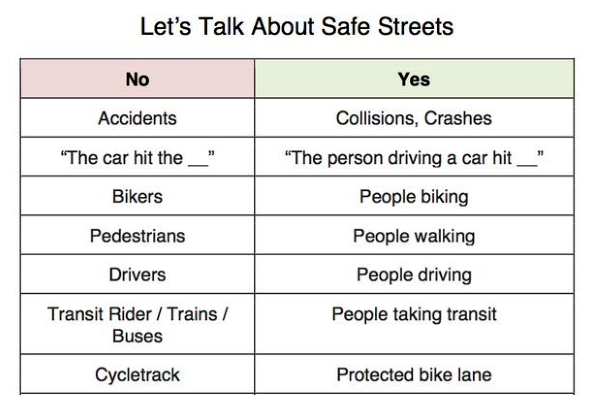Change the way you speak about everyday bicycling and those who drive
Is it really that important to rethink about the language we use to describe road-user conflicts on our streets? If the experience of those in Seattle is any indication, it just might be.
Here’s some backstory. According to an article from Momentum Mag,
“If you were tuned into Seattle, WA’s, transportation debates in 2010, the first thing you would have heard about is the ‘war on cars.’ Calls for more bike lanes and safer streets were being depicted in mainstream media as a militant attack on the rights of automobile drivers by the warring mobs of cyclists. This statement, a war on cars, was often left unquestioned, and led to a pervading sense of animosity amongst many of the city’s residents.”
Activist Cathy Tuttle founded a group in 2011 to change the direction of this off-shoot of the culture wars. Four short years later, “Seattle went from being the battleground for one of the most divisive transportation debates in the country to having one of the country’s most progressive transportation agendas.”
What changed? Partly through the use of a different vocabulary, Tuttle’s group, Seattle Neighborhood Greenways, re-framed the debate to focus on the real issues at hand. Instead of an us-versus-them donnybrook, their message centered on giving people safe choices for their commutes.

It’s tempting to dismiss the idea as “right speak” (think Aldous Huxley’s Brave New World) at it’s worst. But is it? If you’ve listened to the irrationality from both sides, it can feel like logic has already passed us by. It’s fair to say that we can’t snap our collective fingers, change a few words, and hope a protected bicycle lane network will materialize tomorrow. But, if we change the way we talk to each other about the people who drive cars and people (notice the emphasis on people) who ride bikes, over time, we can change the way Bend’s populace thinks about healthy transportation.
For a quick rundown on some terms you might want to rethink, see this People for Bikes article.
